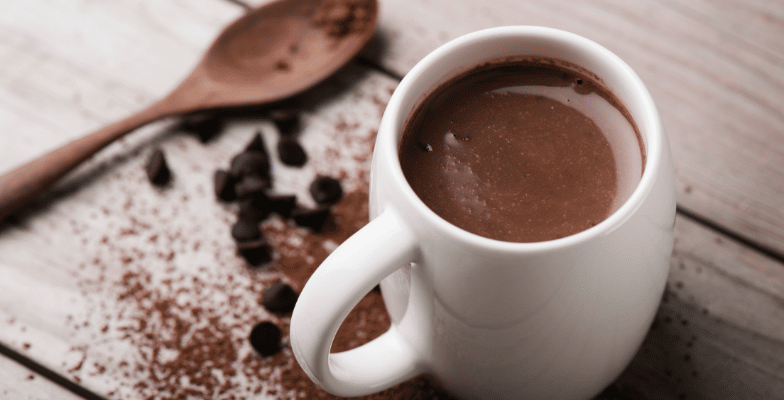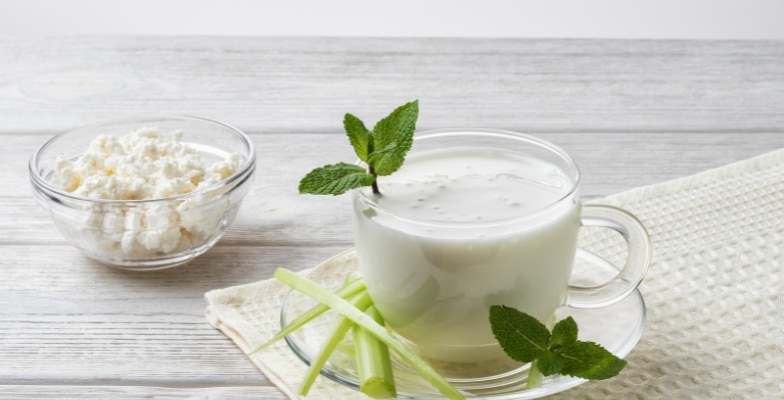Is Hot Chocolate Good For You? Health Benefits Of Cocoa
- The Difference Between Cacao And Cocoa
- Health Benefits Of Cocoa
- How To Make Hot Chocolate
- Is Hot Chocolate Good For You?
- Precautions
- Conclusion

What is it about a mug of hot chocolate in winter that brought a warm smile to my face? Or the happy feeling I got when my parents awarded me a bar of chocolate as a treat? Hot chocolate warmed me up on a cold day with the ultra-luxurious, thick, silky, creamy taste of chocolate.
Chocolate has been rumored to be a love potion for centuries, and no wonder that apart from being a children’s beverage, hot chocolate has been a favorite of dictators, warriors, and travelers for centuries.
Theobroma cacao is the scientific Latin name for the cacao trees native to the Americas’ deep tropical region. Generally, cocoa trees are planted next to tall trees to protect them from direct sunlight. The soil can influence the flavors of the cocoa beans.
The Difference Between Cacao And Cocoa
Many of us don’t know the difference between cocoa and cacao. Cacao is the bean, and cocoa is the roasted beans. Chocolates are made from cocoa seeds. Bitter chocolate is produced by roasting and pressing cocoa seeds between hot rollers.
Cocoa powder is produced by squeezing cocoa butter (fat) from bitter chocolate and powdering the residue. White chocolate does not contain any cocoa solids and is made from cocoa butter, milk solids, and sugar.
In contrast, sweet chocolate is produced by adding sugar and essence to cocoa butter. Commercially produced chocolates and cocoa products may not be rich in beneficial flavanols, as over-processing can destroy flavanols. 1https://bmcchem.biomedcentral.com/articles/10.1186/1752-153X-5-53, 2https://ifst.onlinelibrary.wiley.com/doi/abs/10.1111/j.1365-2621.2011.02670.x
There is a difference in the nutrition provided by one oz (28g) of unsweetened Cocoa Powder, 70% dark chocolate and hot chocolate. 3https://nutritiondata.self.com/facts/sweets/5471/2
Health Benefits Of Cocoa
Cocoa powder is beneficial, especially if it is at least 70% cocoa. Here are some of the health benefits of cocoa.
Heart Health
Polyphenols are phytonutrients, compounds naturally found in plant foods that provide various health benefits. Among the foods rich in polyphenols, dark chocolate or cocoa beans are of particular interest, as cocoa is a rich source of polyphenols.
Regularly consuming polyphenols is thought to boost digestion and brain health and protect against heart disease, type 2 diabetes, and even certain cancers. 4https://www.ncbi.nlm.nih.gov/pmc/articles/PMC6160559/
Research indicates that eating dark chocolate or cocoa products for 2-8 weeks may lower the top (systolic) blood pressure readings by four mm Hg. The bottom number (diastolic blood pressure) may be reduced by two mmHg in people with high blood pressure. 5https://pubmed.ncbi.nlm.nih.gov/28439881/
A few other clinical interventional studies demonstrated a positive effect of flavanol-rich cocoa or chocolate intake on the reduction and improvement of the blood pressure along with improved glucose and lipid profiles. 6https://www.ncbi.nlm.nih.gov/pmc/articles/PMC5539137/
Several epidemiological studies (which identify risk factors for disease and targets for preventive healthcare) suggest a strong correlation between daily cocoa intake and better cardiovascular health measures. 7https://pubmed.ncbi.nlm.nih.gov/28824916/
Related Article: Phytonutrients Definition | Phytonutrients Foods And Chart
Improved Cognitive Health
Cerebral ischemia is when a blockage in an artery restricts oxygen-rich blood delivery to the brain, resulting in brain tissue damage. A cognitive decline accompanies the state. A study on healthy subjects aged 59- 83 years suggested that flavonoid-rich cocoa (FRC) intake may directly increase blood flow to the brain of healthy older adults.
The research data suggests a promising role for regular consumption of flavanol-rich cocoa in treating ischemic cerebrovascular syndromes, including dementia and stroke. 8https://www.ncbi.nlm.nih.gov/pmc/articles/PMC2518374/
May Improve Mental Health
Cocoa powder and chocolate contain reasonable amounts of antioxidants and flavonoids, most abundantly in the form of epicatechin, which may positively affect mood and emotional stress. 9https://www.sciencedirect.com/science/article/pii/S1756464612001405, 10https://www.nature.com/articles/tp2014135
The antioxidants in cocoa appear to positively affect blood flow to the brain, oxygen levels, and nerve function, as measured by testing electrical activity in the brain after subjects consumed cocoa drinks. 11https://pubmed.ncbi.nlm.nih.gov/22775434/
A study hinted that a more frequent intake of chocolate by pregnant women might reduce stress and improve the mood of the babies. 12https://pubmed.ncbi.nlm.nih.gov/14757265/ Another study suggested that drinking polyphenol-rich cocoa improved calmness, psychological well-being, and overall health among senior men. 13https://www.ncbi.nlm.nih.gov/pmc/articles/PMC2518374/
Stronger Immune System
One ounce (28 g) of cocoa powder contains iron (about 22% of the daily value), zinc (13%), and selenium (6%). These minerals, along with the polyphenols in cocoa, help the body function and boost the immune system. 14https://www.ncbi.nlm.nih.gov/pmc/articles/PMC3671179/
How To Make Hot Chocolate
Hot chocolate is just what it sounds like, hot chocolate, or what many call ‘drinking chocolate.’ It is made from chopped bits of chocolate melted slowly and painstakingly, then blended with milk, cream, or water.
In comparison, hot cocoa is made from cocoa powder. Commercially available hot chocolate may have added sugar and calories, and we need to watch our calorie intake from hot chocolate.
Related Article: Calories In Calories Out: CICO | Does It Matter?
It is always better to make hot chocolate at home from scratch rather than buy ready-made products. A straightforward recipe is to mix good-quality cocoa and sugar (the less, the better) with a pinch of salt in a pan. Add boiling water to the pan and let it simmer on low heat for two minutes.
Watch that it doesn’t burn. Stir in three cups of milk and heat until it’s hot, but do not boil! Please remove it from the heat and add the essence of your choice. You can add extra flavors to hot chocolate. The latest exciting trend is to add cayenne pepper!
Is Hot Chocolate Good For You?
As high-end chocolate sales have increased over the past few years, restaurants have gone back to hot chocolate’s roots with premium drinks infused with spices. Chocolate is commonly associated with weight gain.
Dieters and obese individuals sometimes fear chocolate and feel guilty eating or drinking it. But cocoa contains exceptionally high quantities of phenolic phytochemicals known as flavanols. Cocoa itself is low in fat and sugar.
The calories in cocoa are packed with healthy compounds. 15https://www.ncbi.nlm.nih.gov/pmc/articles/PMC4285439/ Studies suggest cocoa helps regulate fat and carbohydrate metabolism, and cocoa’s pleasant aroma may increase satiety and reduce appetite. 16https://pubmed.ncbi.nlm.nih.gov/24000103/
Although eating chocolate is perceived as indulgent and fattening because of its calories, randomized trials have found no increase in weight after prolonged consumption of small amounts of cocoa. 17https://pubmed.ncbi.nlm.nih.gov/18510961/, 18https://pubmed.ncbi.nlm.nih.gov/18504447/
Given the potential beneficial effects of cocoa on conditions frequently associated with obesity and the negligible risk of weight gain related to moderate chocolate intake, average chocolate consumption appears to have a favorable risk/benefit profile for obese individuals. 19https://www.ncbi.nlm.nih.gov/pmc/articles/PMC4696435/
Additionally, a weight-loss study using low-carbohydrate diets discovered that a group given 42 grams of 81% cocoa chocolate a day lost weight faster than the regular diet group. 20https://www.researchgate.net/publication/276892317_Chocolate_with_high_Cocoa_content_as_a_weight-loss_accelerator Note that lower quality chocolates may have added butterfat, vegetable oils, artificial colors and artificial flavors.
Choosing dark chocolate and eating it in modest quantities may offer the most significant health benefits. It appears that cocoa-rich products may help facilitate weight loss or maintenance, but further studies must confirm this.
Precautions
Eating cocoa is mostly safe, but do keep in mind that cocoa contains caffeine. Consuming large amounts of caffeine may cause side effects such as nervousness, increased urination, sleeplessness, and a faster heartbeat.
And for the same reason, consuming cocoa in large amounts during pregnancy or lactation should be avoided or done with a physician’s knowledge.
Cocoa products must be stored in a cool, dry area (65-70 F) in a tightly sealed container. Do not refrigerate. The chocolates may ‘bloom,’ producing a whitish-grey coating caused by sugar rising to the surface due to excess moisture. Bloom does not affect the flavor but does not look appealing.
Conclusion
By itself, cocoa doesn’t contain much sugar or fat. Most commercial chocolate products, however, have added sugars and fats. Intake of appropriate amounts of flavanol-rich cocoa-derived products (60-70% cocoa) may benefit both cardiovascular function and mental well-being.
We can all enjoy drinking sweet, homemade hot chocolate on cold days and dark chocolate in small quantities without any guilt. And If eating chocolate makes you happy, go for it once in a while.
What do you think of this article? Have any questions? Let me know in the comments below!

Skill-Based Education.
Global Recognition.
Powerful Community Building
Secure a certificate of completion in as little as a day by graduating from one of our free courses.
Get Access to Our Free Courses. No Credit Card Required.

Fabulous Body Membership
Your All-Access Pass to A Fabulous Body & A Rewarding Career
25+ Certificate Courses & Programs, All Included
15 Day Free Trial, 100% Money-Back Guarantee
About Kamini Thakar
Kamini is a very skilled writer/content creator. As a part of Fabulous Body for years, she has authored many articles really proving her prowess in acquiring and presenting knowledge about various health & nutrition topics.










